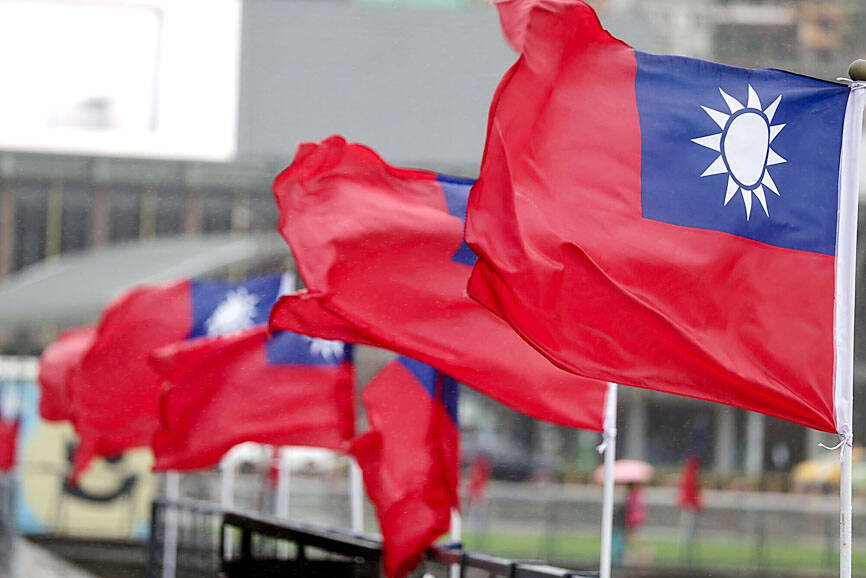The Republic of China (ROC) is Taiwan’s sole legal government, and the “status quo” is that the ROC and the People’s Republic of China (PRC) exist equally as separate entities that are not subordinate to each other, Minister of Foreign Affairs Lin Chia-lung (林佳龍) said, rebutting Chinese Minister of Foreign Affairs Wang Yi’s (王毅) claim that Japan “returned” Taiwan to China after World War II.
Wang made the remarks on Friday during a news briefing following the 10th Mekong-Lancang Cooperation Foreign Ministers’ Meeting in Anning, Yunnan Province, which he attended with his counterparts from Cambodia, Laos, Myanmar, Thailand and Vietnam. The meeting coincided with the 80th anniversary of the end of World War II.
In a statement issued yesterday, the Chinese Ministry of National Defense said Wang had “urged Japan to learn from history to earn respect and avoid straying onto the wrong path again.”

Photo: I-Hwa Cheng, Bloomberg
“A series of international instruments, including the Cairo Declaration and the Potsdam Proclamation, clearly defined Japan’s responsibility for the war and required that Japan return the territories it had stolen from China, including Taiwan,” the news release quoted Wang as saying.
“This was the unchallengeable outcome of the victory of the world anti-fascist war and constitutes an important part of the post-war international order,” it quoted him as saying.
The Ministry of Foreign Affairs (MOFA) in Taipei said Lin strongly rejected Wang’s “distortion of history and false claims.”
Following the end of World War II, the Treaty of San Francisco, which is legally binding under international law, replaced the Cairo Declaration and the Potsdam Proclamation, which were political statements, MOFA quoted Lin as saying.
“The Treaty of San Francisco did not hand over Taiwan to the PRC, and the PRC has never ruled Taiwan,” the ministry quoted him as saying.
DEMOCRACY
Since the 1980s, Taiwan has advanced political liberalization and democratization from the bottom up, culminating in its first direct presidential election in 1996, he said.
Since then, the ROC’s central government and legislature have been chosen through popular elections, establishing effective governance, he said.
The ROC is the only legal government representing Taiwan, forming the “status quo” in which the ROC and the PRC exist equally as separate entities and are not subordinate to one another, he added.
Taiwan has experienced three peaceful transfers of power through presidential elections in 2000, 2008 and 2016, further consolidating its democratic system and strengthening its political identity, while reflecting the firm commitment of Taiwanese to freedom and democracy, he added.
“It is an objective fact that the ROC, Taiwan and the PRC are not subordinate to each other, and the PRC has no right to represent Taiwan in international society,” Lin said.
MOFA yesterday urged Beijing to practically and reasonably recognize that only through equitable and mutually respectful dialogue with the government elected by the people of Taiwan can cross-strait relations improve.
At the same time, Taiwan hopes its democratic partners can join together under a “democratic umbrella,” and jointly face the challenges posed by authoritarianism and defend shared values and the rules-based international order, the ministry said.

‘WIN-WIN’: The Philippines, and central and eastern European countries are important potential drone cooperation partners, Minister of Foreign Affairs Lin Chia-lung said Minister of Foreign Affairs Lin Chia-lung (林佳龍) in an interview published yesterday confirmed that there are joint ventures between Taiwan and Poland in the drone industry. Lin made the remark in an exclusive interview with the Chinese-language Liberty Times (the Taipei Times’ sister paper). The government-backed Taiwan Excellence Drone International Business Opportunities Alliance and the Polish Chamber of Unmanned Systems on Wednesday last week signed a memorandum of understanding in Poland to develop a “non-China” supply chain for drones and work together on key technologies. Asked if Taiwan prioritized Poland among central and eastern European countries in drone collaboration, Lin

The Chien Feng IV (勁蜂, Mighty Hornet) loitering munition is on track to enter flight tests next month in connection with potential adoption by Taiwanese and US armed forces, a government source said yesterday. The kamikaze drone, which boasts a range of 1,000km, debuted at the Taipei Aerospace and Defense Technology Exhibition in September, the official said on condition of anonymity. The Chungshan Institute of Science and Technology and US-based Kratos Defense jointly developed the platform by leveraging the engine and airframe of the latter’s MQM-178 Firejet target drone, they said. The uncrewed aerial vehicle is designed to utilize an artificial intelligence computer

Renewed border fighting between Thailand and Cambodia showed no signs of abating yesterday, leaving hundreds of thousands of displaced people in both countries living in strained conditions as more flooded into temporary shelters. Reporters on the Thai side of the border heard sounds of outgoing, indirect fire yesterday. About 400,000 people have been evacuated from affected areas in Thailand and about 700 schools closed while fighting was ongoing in four border provinces, said Thai Rear Admiral Surasant Kongsiri, a spokesman for the military. Cambodia evacuated more than 127,000 villagers and closed hundreds of schools, the Thai Ministry of Defense said. Thailand’s military announced that

CABINET APPROVAL: People seeking assisted reproduction must be assessed to determine whether they would be adequate parents, the planned changes say Proposed amendments to the Assisted Reproduction Act (人工生殖法) advanced yesterday by the Executive Yuan would grant married lesbian couples and single women access to legal assisted reproductive services. The proposed revisions are “based on the fundamental principle of respecting women’s reproductive autonomy,” Cabinet spokesperson Michelle Lee (李慧芝) quoted Vice Premier Cheng Li-chiun (鄭麗君), who presided over a Cabinet meeting earlier yesterday, as saying at the briefing. The draft amendment would be submitted to the legislature for review. The Ministry of Health and Welfare, which proposed the amendments, said that experts on children’s rights, gender equality, law and medicine attended cross-disciplinary meetings, adding that